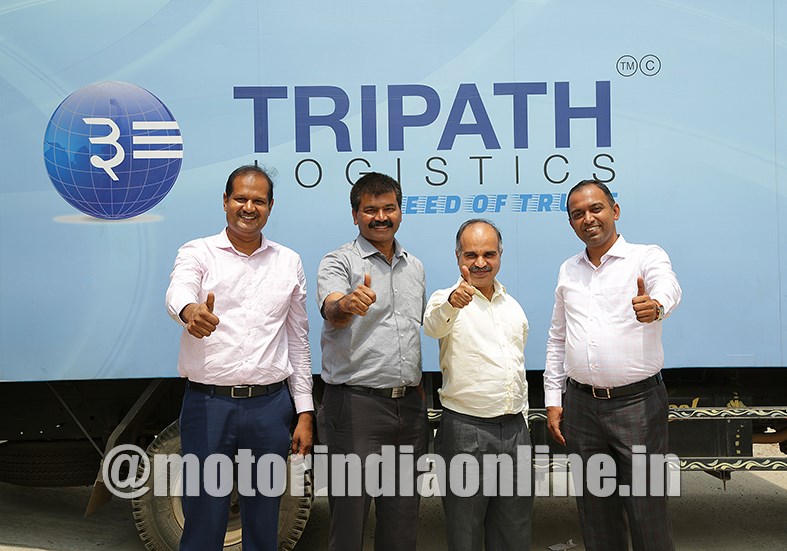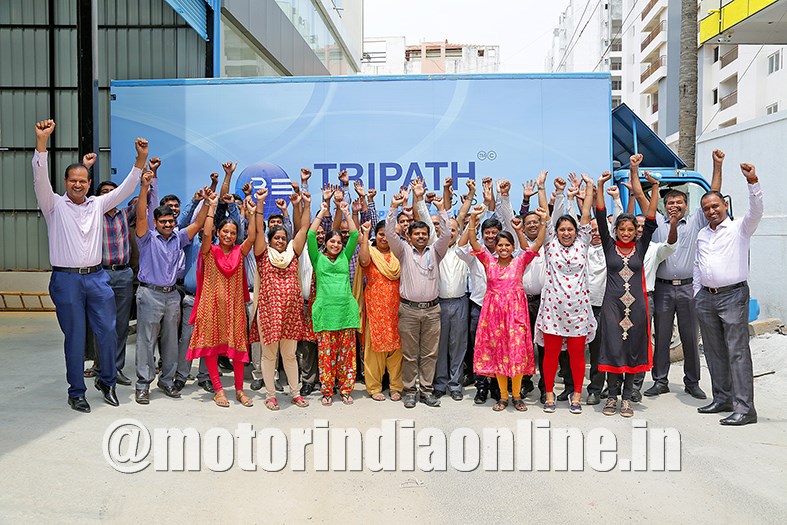The name literally encompasses all that the company offers as a logistics entity. Going by the official description, the key sound ‘Tri’ in Tripath Logistics refers to the River Ganges, one of whose many names is ‘Tripatha Gamini’. The name in Hindu scriptures indicates the river’s arduous yet jubilant journey from the ‘swarga’ (heaven) to ‘bhumi’ (earth) to nourish humans and then finally reach ‘patala’ (netherworld). The hidden meaning in tracking the River Ganges’ journey indicates logistics. On another note, ‘Tri’ is three in its etymological meaning – be it in Indian languages or in English – and it symbolises Tripath Logistics’ tri-fold services, by road, air and water ways, including project cargo handling.

Service with trust
When one talks to the officials of Tripath Logistics, it is easy to perceive a deeply embedded sense of trust – both that they offer to their clients and the trust that their team has invested in the founding directors.
Tripath Logistics was founded by six professionals in September 2014 when their previous logistics company was acquired and their colleagues were in the danger of losing jobs.
Mr. Badari G. Gubbi, CMD, shares: “We decided then to start out on our own where all six of us decided to take care of every aspect of the business. We started operations in January 2015. Even with the initial financial struggle, we could record a turnover of five crore rupees in the first three months. All of us worked hard and, by next year, we jumped to Rs. 57-crore turnover. This year we are touching Rs. 120 crores. Within the first six months, we opened up 13 branches across India.”
And he vociferously offers all his gratitude to the ‘good nature’ of their colleagues who trusted them enough to leave the sinking company and join Tripath.
If initially, their team strength was 75, today Tripath is 200-employee strong.
Mr. R. Abbas Khan, Director – Corporate Planning, adds: “Our customers, both domestic and overseas ones, supported us in our highs and lows. In fact, what was heartwarming for us was that a few customers vied for being the first customer of Tripath.”

Mr. Ravindra Kumar K, Director – Sales & Agency Development, chips in: “We all came in as a team, and that is our strength. It is a fact that none of us are hardcore salesmen. But we have turned it into an advantage, and now whoever goes out sells the services and we bring in money.”
Mr. Ramachandra Kulal, Director – Pricing, says: “This is a service industry and the customer stays with us because of the service. Our customers have known us for long so they know the quality of our service.”
Clearly, it is this level of commitment to create a robust future together which has made Tripath succeed in its efforts to carve a niche for itself.
Mr. Gubbi agrees: “Tripath, currently, is at a size where protocols do not consume precious time in delivering solutions. We trust our colleagues and hence we have given them the freedom to make the right decisions which support our company’s growth. This helps us in further building the trust with our customers because our responses are prompt.”
Surface logistics & diversification plans
Tripath uses road transport for the local movement of goods, mainly engineering products, textiles, automotive components, perishables like life-saving drugs and flowers – for imports and exports.
Mr. Khan shares: “We have six vehicles of our own for this purpose in Bangalore and one in Delhi. So in most of the locations, we outsource them. For perishables, we hire reefers from the port. Soon, we may invest in a few more trailers though.”
Logistics as a service has already experienced a sea change over the last few years. With e-commerce booming in India, the way deliveries are being done too has transformed drastically. And that has the potential to pose a big challenge for Tripath.
Mr. Ravindra explains: “We are rising up to the challenge by shedding old and traditional way of logistics.”
Mr. Gubbi says: “Things are changing swiftly, and it will soon be a question of survival in the next couple of years. So we are molding ourselves by thinking quick. We are planning diversification and one way is to add warehouses to our business.”
Mr Ravindra adds: “We are looking at private bonded warehouses – also non-bonded ones – so that we can offer the service of storing the goods of the customers. We don’t need custom-clearance each time, but merely pay the duty when required. For the customers it is a value-add because it consumes lesser time and they can buy in bulk and store in our warehouses.”
Tripath has recently received the Authorized Economic Operator or the AEO Certification which qualifies it for customs regulation and the customers benefit from the faster processing time. He further shares: “In future, maybe we will get a 15-day credit limit for paying the custom fee.”
Tripath, in its attempt to comply with ‘ease of doing business’, has all other relevant certifications too under its belt, including the International Air Transportation Association (IATA), International Federation of Freight Forwarders Associations (FIATA), Multi-modal Transport Operator (MTO) and ISO, among others.
Acing logistics as a service
All of Tripath’s efforts are directed at expansion, ease of doing business and transparent business ethics coupled with trust. The company has developed its own software based on the customer feedback and the uniqueness of it has caught the attention of similar firms in Europe too.
The expansion plans include opening offices in other countries. Recently, Tripath opened an office in Colombo. Another is in the offing in the UK in the near future.
In a nutshell, the six core members of Tripath have managed to trickle down their vision of helping the company grow to the level of a multinational, where every transaction is driven by trust and transparency.